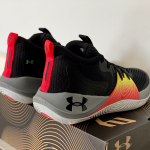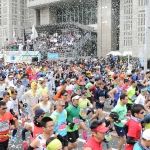You would be wondering “Where does the protein come from”.
These 5 factual guides will lead to the saying “Optimal nutrition is key to an optimal performance.”
With a proper vegan diet plan, you will find yourself bursting with energy and feeling great while you’re on the track!

1. No more protein, just more calories!
While protein is vital to us, it is not the lack of it that makes us exhausted, but actually it’s the lack of overall calories.
A common misconception implies that vegan diet gets nothing more than vegetables, thus the lack of protein. However, they overlook the fact that plants, grains, and starchy vegetables supply a decent amount of it!
As long as you consume a wide variety of plant-based foods, you will be well energised, even when trying for a marathon.

2. Eating carb-rich food before and after exercising.
Even if your body is not in favour of food before an early morning exercise, you need to top off your glycogen. It will help you to work harder, last longer, and recover better!
You should try avoiding fibrous foods during a meal, as fibre stays in your stomach longer, thus increasing your chance of gastrointestinal trouble when you least need it!
After working out, you have about 30-60 minutes to have your meal. The carbs consumed within that time go directly to your muscle and liver and get stored as glycogen for your next workout.
An ideal ratio of carbs to protein is 4:1 – suggesting oatmeal, cereal, pancakes and smoothies that work well.

3. Detach from “numbers” in your diet.
Don’t get caught up in the “numbers game” when it comes to calories, carbs, protein, or fat ratio, as it distracts you from your actual fitness goal. Instead, eat a healthy diet that is full of a variety of whole, plant-based components for optimal health and athletic performance.
Scientists and doctors propose the consumption of starchy vegetables and grains complemented with vegetables, beans, fruits, and berries close to their ‘whole’, natural state as a diet that’s most beneficial to human health.

4. Benefits of plant-based foods for athletes.
Antioxidants found in plants reduce oxidative effect of exercise on our bodies and help flush out lactic acid that makes our muscles sore.
Plants contain up to 64 times the amount of antioxidants than meat, fish, dairy and eggs. Watercress, cherries and citrus fruits have shown positive effect on post-exercise recovery in studies.
Consuming plants provides us with macro- and micronutrients, fibre, antioxidants, vitamins, minerals, and none of the artery-clogging cholesterol or hard-to-digest animal protein.
Studies have shown that eliminating all added oils from our diet can repair the endothelial cells that make up the inner lining of our arteries, thus not only preventing, but also reversing heart disease!

5. Supplements for plant-based athletes.
Everyone who eats a plant-based diet should supplement with vitamin B12, which does not occur naturally in plant foods. It is most prevalent in meat and eggs.
A B12 deficiency causes extreme exhaustion in your fingertips, which can be detrimental to an athlete.
Foods often touted to be rich in B12 include unwashed organic produce, mushrooms grown in B12-rich soils, seaweed, spirulina, chlorella, and nutritional yeast.
B12-fortified foods commonly include plant milks, soy products, breakfast cereals, and nutritional yeast.




